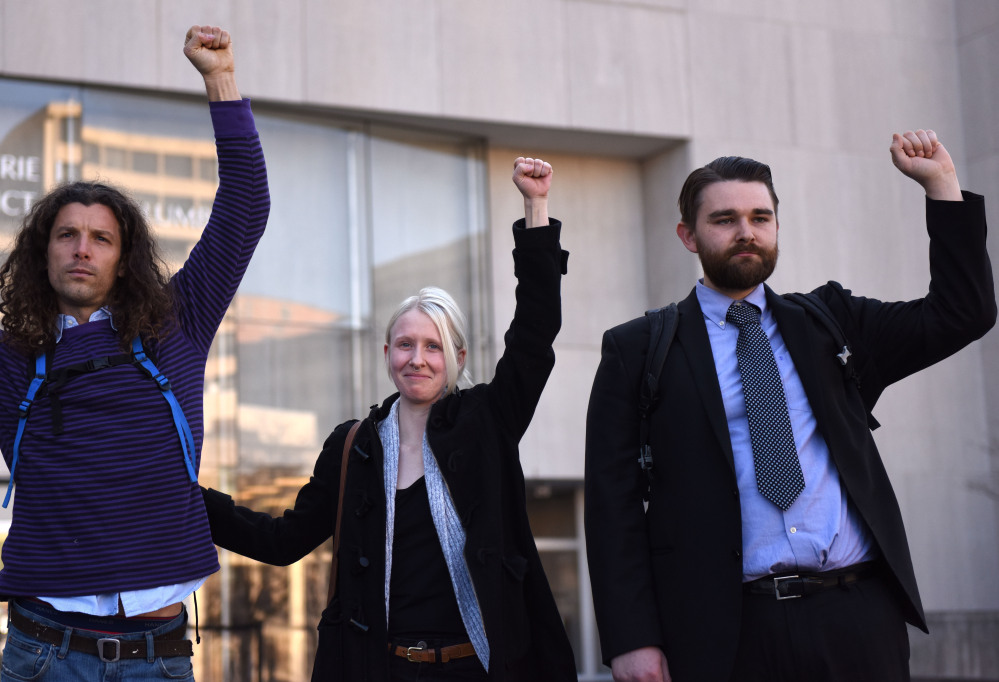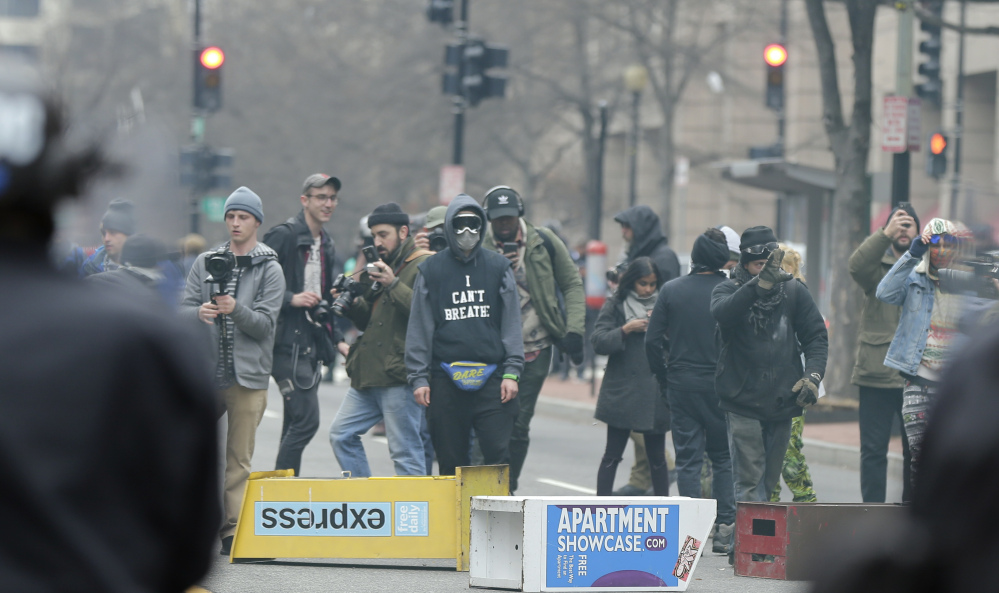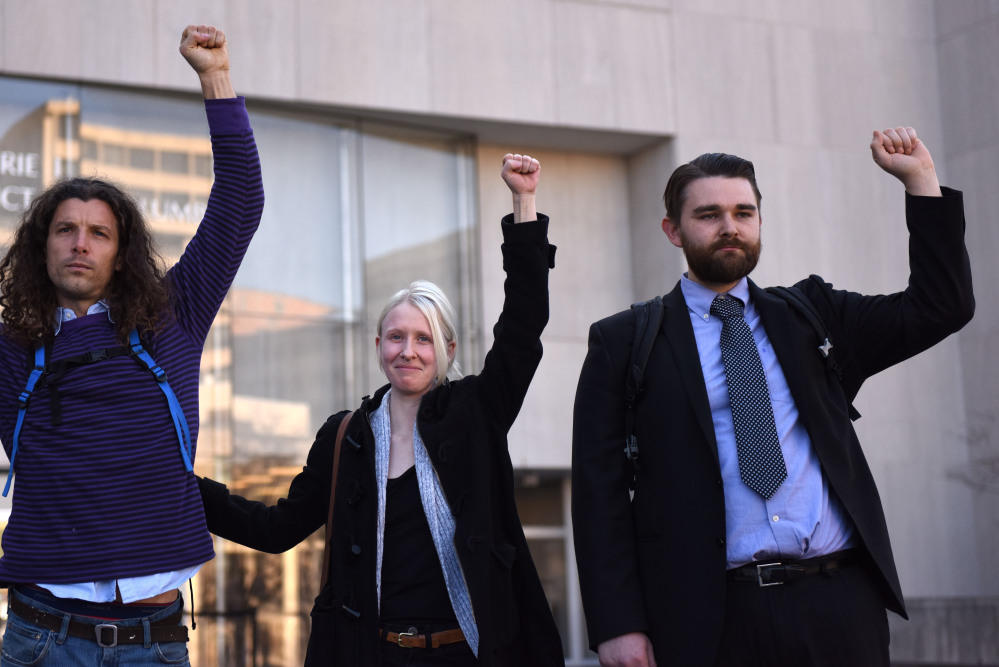WASHINGTON — The first six people to face trial in Inauguration Day protests that turned destructive in the nation’s capital were acquitted of all charges, a victory not only for the defendants but also for advocates who argued the government overreached in its effort to prosecute more than 200 people arrested as they marched through the city.
After a nearly four-week trial and two full days of deliberations, a District of Columbia Superior Court jury delivered not-guilty verdicts Thursday on multiple charges of rioting and destruction of property.
The defendants – including a nurse for cancer patients, a freelance photographer and a college student – joined throngs of protesters who took to the streets on Jan. 20 to protest Trump’s election. Prosecutors said the six were among a group that cut a violent swath through 16 blocks of the city, smashing businesses’ windows, tossing newspaper boxes into the street and damaging a limousine. Authorities tallied the damage at more than $100,000.
As the jury foreman read the not-guilty verdicts, the defendants began to smile. One of them, Alexei Wood, a 37-year-old freelance photographer from San Antonio, covered his face, sat down and began sobbing.
Outside the courtroom, Wood and the other defendants hugged one another and their supporters. One, in tears, pulled out her iPad to FaceTime her family and friends.
‘THE ONLY JUST VERDICT’
Jennifer Armento, 38, a Philadelphia woman who was among the six, said the verdict “shows the country that the jury was unwilling to do what the government wanted them to do, which was criminalize dissent.”
Oliver Harris, 28, a Drexel University doctoral student who was charged, said the acquittal was “the only just verdict.” He called his arrest and trial “repeatedly traumatizing.”
Also acquitted were Michelle Macchio, 26, of Naples, Florida; Christina Simmons, 20, of Cockeysville, Maryland; and Brittne Lawson, 27, of Pittsburgh.
From the start, defense attorneys said their clients and most others in the group of about 500 were peacefully protesting, while only a handful peeled off and became violent. They criticized police for failing to identify those people and said officers unfairly herded a group of about 200 and charged them with rioting.
During his closing argument last week, attorney Steven McCool, who represented one of the men on trial, appealed to jurors to protect the “rights of free speech.”
But prosecutors said the demonstration, planned by a group that calls itself DisruptJ20, was aimed at destruction, not freedom of expression. Authorities say the group used “black bloc” tactics – wearing dark clothing and hiding their faces with masks and goggles so it would be harder to identify them. Some came armed with hammers, crowbars and bricks.
Prosecutors told jurors there was no evidence the six people on trial were personally involved in the vandalism but argued that they chose to remain with the group, essentially providing cover for those who caused the damage.
In his closing argument, Assistant U.S. Attorney Rizwan Qureshi told jurors the group “tore up your city, putting people in danger.”
He presented the jury with the analogy of a bank robbery, likening the defendants to a getaway driver while comparing those who smashed windows to the robber in the bank.
“They are both just as guilty,” Qureshi said. “This was not a First Amendment activity. They conspired by joining in the group to do unlawful things on the streets of your city.”
One 59-year-old juror said the panel tried to determine the mind-set of the defendants and whether “they supported the riotous behavior or they just had strong convictions about what they’re protesting about.”
They decided the evidence “only demonstrated that these six individuals walked in a protest.”
Another juror, a 37-year-old man, said jurors made up their minds to acquit three defendants fairly early in their deliberations, but there was additional discussion about Wood, Macchio and Harris.
The juror said the panel considered whether video showing Wood cheering while others were breaking windows was evidence of guilt.
They also discussed whether Harris, who was seen casually walking through the crowd as the rioting unfolded, should be convicted. And they talked about text messages Macchio sent, telling a friend she had arrived with the group. But they ultimately decided none of those behaviors were enough to prove the government’s case.
“There was no evidence to support whether or not these six willingly participated in the riots or aided and abetted the rioters,” said the juror, who like the other juror spoke on the condition of anonymity to protect his privacy.
pROSECUTION STATEMENT
In a statement after the verdict, the U.S. attorney’s office said prosecutors continue to assert that a riot occurred on Inauguration Day and that the “destruction impacted many who live and work in the District of Columbia, and created a danger for all who were nearby.”
“We appreciate the jury’s close examination of the individual conduct and intent of each defendant during this trial and respect its verdict,” the statement said. “In the remaining pending cases, we look forward to the same rigorous review for each defendant.”
The case follows one of the largest mass arrests for vandalism in the city, and authorities spent months preparing for trial and mining for evidence. Authorities confiscated the cellphones of the defendants to examine text messages and videos.
And prosecutors sought court orders for defendants’ Internet records, including website visits and Facebook accounts, in hopes of securing additional evidence to support their theory that the protesters planned to participate in a violent demonstration. The searches were challenged by attorneys and civil liberties groups as violating the rights of the users.
Jurors heard from about 40 witnesses, including employees and patrons of businesses who described their fear as protesters smashed windows. The jury spent hours watching video of clashes between demonstrators and police.
Send questions/comments to the editors.





Success. Please wait for the page to reload. If the page does not reload within 5 seconds, please refresh the page.
Enter your email and password to access comments.
Hi, to comment on stories you must . This profile is in addition to your subscription and website login.
Already have a commenting profile? .
Invalid username/password.
Please check your email to confirm and complete your registration.
Only subscribers are eligible to post comments. Please subscribe or login first for digital access. Here’s why.
Use the form below to reset your password. When you've submitted your account email, we will send an email with a reset code.